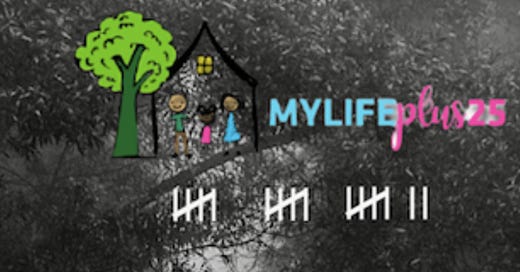Most of the time I'm not even sure if cracking the nut is what I should be doing. It might be that the nut wants to be in its shell. Maybe the hammer, the rock, and everything else I'm using to crack the shell is not at all what needs to be done. Because maybe the nut is just fine where it is, and here I come with my diamond tipped cutter saying, "listen to me, you son-of-a-bitch! I'm coming in one way or another!"
Even if I were to manage to get the nut out of the shell, I have no idea what I'm supposed to do with it. Do I eat it? Plant it? Stick it up my nostril? Throw it at someone? For 20 years I have looked at my wrongful conviction as yet another nut needing to be cracked, almost as though I haven't learned anything from all the other failed attempts at nut cracking along the way--childhood; adolescence; marriage; family; friendship; life purpose; religion; and let us not forget failure. Which is why I have often wished that life came with an owner's manual.
The table of contents would have things like: family, friends, career choices, bad friends, relationships, marriage, children, neighbors, coworkers, lovers, money, shitty bosses, medical problems, and definitely a few words of wisdom on the mysteries of success and the inevitability of tragedy. The latter could be addressed in appendices with names like Up Shit Creek! Fair Weather Friends and maybe something about Sky Fall.
Obviously shitty predicaments are a staple of a well-lived life. The sudden divorce that you didn't allow yourself to see coming. The summons to the boss's office where you're told that your presence there is now redundant. The call from the doctor who wants to tell you something in person. The call that your child has just been expelled, yet again! There is really no shortage of possibilities here, other than to say that regardless of how easy we might think life is, it will most certainly find any number of ways to prove us wrong. Hence, life is a difficult nut to crack!
Before I fell into the labyrinth that is our legal system, I too thought that I had life figured out. Like a Rubik's cube I once discovered in the back seat of a neighbor's car and had solved before we got to the restaurant. I picked it up, made several adjustments, adjusted those adjustments, and there it was color coded and perfect. I was 12. Of course, I hadn't yet realized that the colored panels on life's Rubik's cube don't stay the same, but instead change as rapidly as clouds shift.
At age 12, I looked at that puzzle and thought, piece of cake. But little did I know that fifteen years later life would have a much more realistic Rubik's cube for me to solve. If the basic Rubik's cube of life has colored panels that change, the legal system's Rubik's cube has panels that not only change colors, they regularly disappear!
I have now spent 20 years twisting, turning, bashing, throwing, and otherwise trying to solve or dismantle the rapacious Rubik's cube that is my wrongful conviction, only to discover that it's not really a question of whether or not I can solve the puzzle. Rather, the question is whether or not my persistence will prevail in that I am holding the Rubik's cube at the very moment the colored panels shift and appear in the appropriate color and space. You might call it luck, but that's really not it either. Because luck is something that happens to someone by chance, and as far as I can tell those who are exonerated got there by taking their repeated defeats with the Rubik's cube in hand.
So I keep twisting the Rubik's cube to no avail, and though the thought has occurred to me that maybe the puzzle can't be solved, the person I am will not accept that answer. Perhaps because being incarcerated and wrongfully incarcerated are two distinct, savage animals to face down in the same small cage. On the one hand, the incarcerated individual often comprehends the chain of choices and events that led to their predicament. There is a sense of calm that most possess because they always understood, when they were free, that eventually they would end up exactly where they are now. On the other hand, the wrongfully convicted face different kinds of realizations. Observations and laments like, "I can't believe this is really happening!" Or, "They (the authorities in general) don't really care who did it, as long as they have someone to blame so as to close the case." Then come thoughts of hope, things like, "God won't let this stand! He will save me!" But eventually there is a realization that whether or not God or any Higher Power is involved isn't really the pertinent question, because there is enough tragedy in the world to know that there is nothing that can't happen. Therefore, the only relevant question is what and how are we going to address the shifting, changing, disappearing Rubik's cube before us.
When people talk about wrongful convictions the general consensus is that something has been taken from someone that can't be replaced. Compensation may scratch the surface of the individual's predicament, but it certainly doesn't address the problem. Legislation, if such a thing existed to prevent wrongful convictions, would again, only scratch the surface of someone's predicament, but never the problem. Because, for example, the fact that prosecutors face zero consequences when they are knowingly complicit in bringing about a wrongful conviction is not a conversation that any politician wants to have or face.
Maybe it all comes down to the same unspoken observation, in that, had we cracked the shell of the nut we wouldn't have had to swim through the crocodile or shark infested waters to get to wherever we were headed. But, had we not been exposed to the sharks or crocodiles we likewise wouldn't have grown into the people we are, who, as it just so happens to be, are now capable of seeing the nut cracked.. And, the man I am is the person I needed to be for that outcome to take place. So, is it better to have it difficult or easy? Do we crack the nut, or leave it right where it is? These are not easy questions to answer. Mostly because it's hard to look back on the episodes of life already lived and think, "yeah, that went exactly as it should've." It's natural to wish for certain things to have been different, but in all candor it's a foolish lament and nothing good will come from it. Instead, the challenge is one of both acceptance and resistance. This is where I am but not where I have to be; and where I should be is exactly where I am.
Or, maybe I'm the nut and now I'm cracked! If you're interested in finding out which, take a moment to read my petition for writ of certiorari now before the Supreme Court of the United States, and if you agree that what I present needs to be answered by the Court, take a moment and send it to the ACLU, NAACP, MALDEF, LULAC, the Obama Foundation, the Human Rights Defense Center, The Innocence Project, The Center on Wrongful Convictions, or any other organization that you think might be interested in knowing that a major constitutional right is essentially being deleted from our civil rights. My petition can be downloaded at: https://easyupload.io/s61o33







